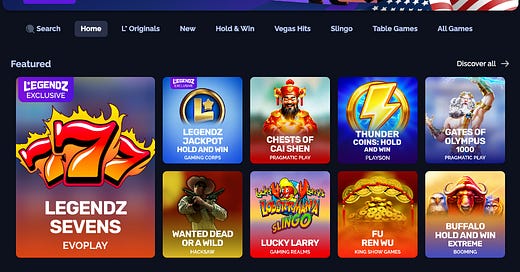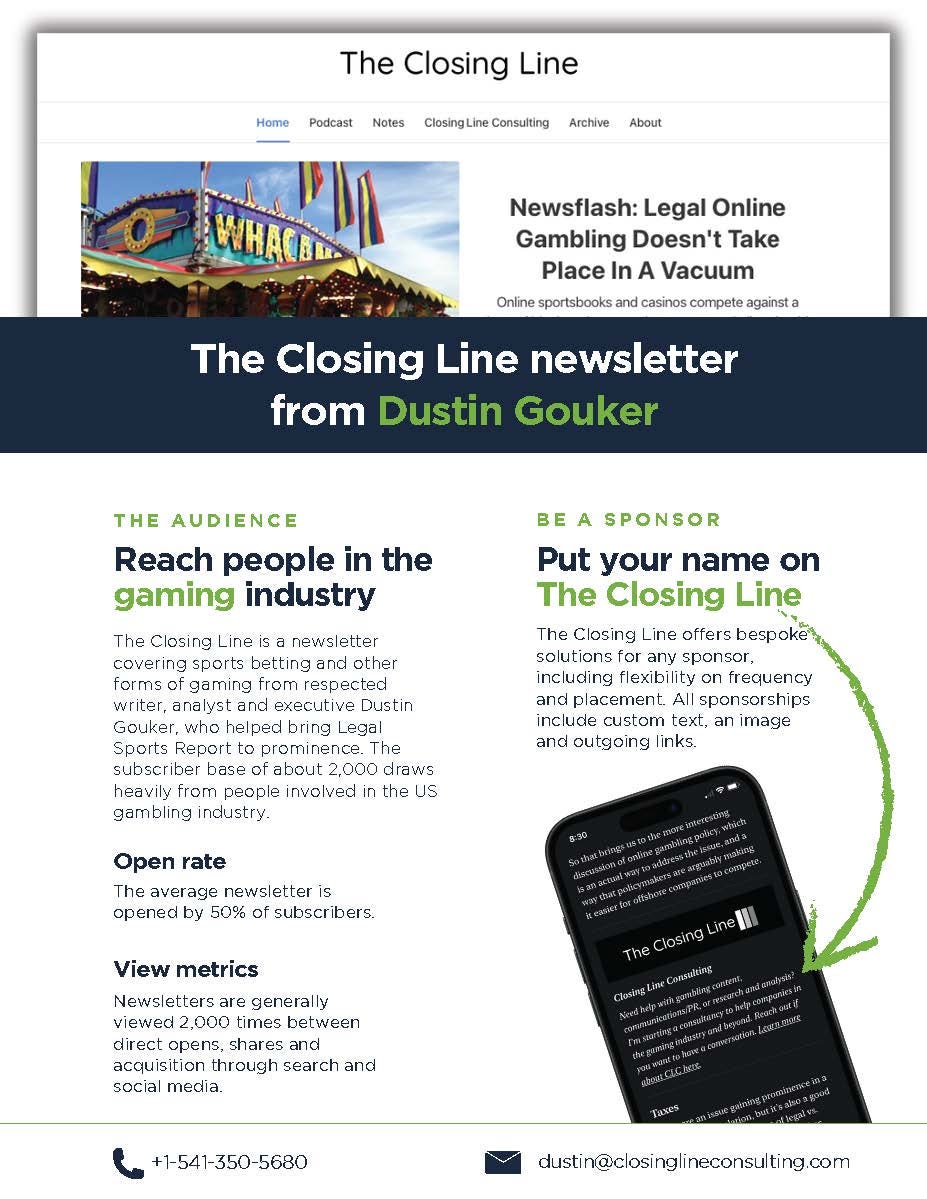The Current: Legendz Launches, Plus 4 Things To Know About Sweepstakes Casinos And Sportsbooks Today
TCL will offer a newsletter on something new in the US gambling space in The Current every Tuesday.
A new sweepstakes sportsbook and casino called Legendz went live in 43 states on Tuesday; site here, press release here. It went live as a fully baked product, with hundreds of slot titles and even live casino games available from the start.
There are some interesting things to take away from the Legendz launch and from what we’ve seen in the sweepstakes industry of late, and I will run down what I have seen.
Gambling industry reverse job board
Are you looking for work in the gambling industry? Or are you hiring? I created a resource to match employees with employers with more than 150 job seekers so far. Check it out here.
But let’s get this out of the way, as this is not meant to be a post about the legality of sweepstakes. In my mind, they’re legal until someone tells them they’re not or until something happens in court. The earliest sweepstakes casino has been serving the US for a decade. I wrote about sweepstakes casinos and sportsbooks several months ago; even with some negative press and opposition surfacing, the actual movement against the sweeps category has been pretty minimal so far.
Are sweepstakes casinos and sportsbooks offering gambling? When you’re a user playing with the real-money equivalent currency, of course they are, they just might not fall under gambling laws, depending on the jurisdiction. But I digress.
1. Legendz and the full PR effort
It’s interesting to note that we see at least some sweepstakes launch with all the bells and whistles now. We also saw this with Rebet, a sweepstakes sportsbook, earlier this year.
Before recently, this was not the norm. The sweepstakes platforms would appear and they would engage in marketing efforts, but not full-on PR. Certainly, there was little “announcing to the world” that they were live as a company. That was by design; Chumba Casino (parent company VGW) had successfully created a massive business by going about things rather quietly and in ways that did call attention to the brand and potential users, but didn’t call attention to the model.
There’s probably good and bad in the PR approach. From one perspective, you’re standing behind the product as legal and helping to legitimize the industry and your company. From another perspective, you’re trumpeting that you’re a social/sweepstakes casino in an era where the model is under fire.
Is the PR a good idea or bad idea? It’s hard to know, but it is interesting.
An aside: It’s fascinating to me that Legendz landed on the name of the sportsbook that was at the center of one of the more famous illegal online gambling cases in the US.
2. Affiliates are pushing sweepstakes forward
Do a search for Legendz, and you’ll get some news about the effort. But you’re also going to get a lot of content supporting the launch, which tells you that customer acquisition here is big business.
For instance, here’s AL.com with some news-facing content that is trying to convert a user to Legendz:
I was in the gambling affiliate business for eight years as the head of content for Catena Media and later as a vice president. We, and most other affiliates, sent leads to sweepstakes casinos dating back to the mid-2010s. Sweepstakes revenue for affiliates was a meaningful but smaller business back then, mostly dominated by VGW and some other early adopters.
Now, though, it’s a sizable business, partly because sweeps has exploded and there are now dozens of brands of vying for users. Look, for instance, at Gambling.com’s page about “Online Gambling Sites in the USA”; they are giving you 28(!) options for sweepstakes casinos if you live in a state that has not yet legalized online casino.
It’s not quite as widespread for sports betting, but you can get sometimes a dozen or more options spread across fantasy and sweeps, depending on where you live. I live in Oregon, where technically DraftKings Sportsbook is the only legal option. However, I am presented with a variety of unregulated options at Rotogrinders, on a page about sports betting, with offers specifically for Oregon. Two of these are sweeps:
My old company said in its most recent earnings report that it is leaning into sweeps, and hoping to drive meaningful growth and revenue. Comments from CEO Manuel Stan:
We made further progress incorporating social sweepstakes casino into most of our casino offerings. Social sweepstakes casino continues to form part of our long-term casino strategy, capitalising on the immediate revenue opportunity while also building our brands and databases in preparation for future regulation, especially as online casino gaming is yet to regulate in the majority of US states.
Anyway, the moral of the story is that all of these sweepstakes casinos are paying affiliates real money for users.
3. States
Legendz is taking what might be called a “conservative” approach to what states it serves. Here are the states that are not allowed for the real-money equivalent:
Idaho
Michigan
Montana
Nebraska
North Dakota
Ohio
Washington
It’s interesting (to me at least) that the list of excluded states isn’t entirely uniform across the sweepstakes industry. For instance, Chumba Casino doesn’t operate in Connecticut, but it does serve Ohio, Nebraska and North Dakota. Fliff, a sweepstakes sportsbook, doesn’t serve Hawaii, Idaho, Louisiana, Nevada or Tennessee. Rebet, another sweepstakes sportsbook, allows users in 48 states (not Idaho and Nevada).
A cease-and-desist to VGW in Connecticut has not stopped other sweepstakes operators en masse.
Make of this lack of uniformity what you will, but it’s something to watch.
4. There can be a big gap in how seriously operators and marketers take the sweepstakes dynamic
I can give some color to how carefully the sweeps industry took its marketing during my time at Catena, at least as of a couple of years ago and earlier. If you didn’t communicate the sweeps dynamic correctly, or if you just said a user would be playing with real money, the sweepstakes partners would not be happy.
Much of the industry is still very careful about all of this, and is arguably draconian (and rightfully so) on the messaging. Legendz, from an initial look, seems to be in this camp. What you’re doing, as a customer, is buying a free currency, and this other currency that you can turn into prizes/real money is provided for free. You’re never gambling with “real money” directly. The preceding is a simplification, but all of this is central to the legal argument for sweepstakes. You have to get this stuff right, otherwise you’re opening yourself up to bad outcomes.
But more and more I see sweeps operators or people marketing on their behalf just not caring about these logistics. They just say you are betting real money instead of the currency on the site or app, or ignoring the purchase dynamics. For instance, here is an activation push alert I have gotten for Rebet:
Technically, we’re not talking about “real money,” we’re still talking about the in-app “cash” that is a one-to-one equivalent for dollars. But Rebet’s not really pretending here that you are at all interested in the Rebet Coins, which is what you are technically purchasing to make all of this work. It’s all done with a wink and a nod, because clearly what they are enticing their customers to get here is Rebet Cash. (Another aside, apparently you can bet on college basketball games at Rebet below Division I.)
I won’t bore you with other examples, but they’re out there. In any event, drifting from the standards that allowed the sweepstakes category to flourish in the first place is perhaps one of the factors that could end up being a problem for the entire category. Your social/sweepstakes casino or sportsbook could be doing it right, but you’re only as strong as your weakest link.
Closing Line Consulting
Need help with gambling content, navigating the North American gaming industry, communications/PR, or research and analysis? I have a consultancy to help in gaming and beyond. Reach out if you want to have a conversation. Learn more about CLC here.
For sponsorship inquiries, email dustin@closinglineconsulting.com.









